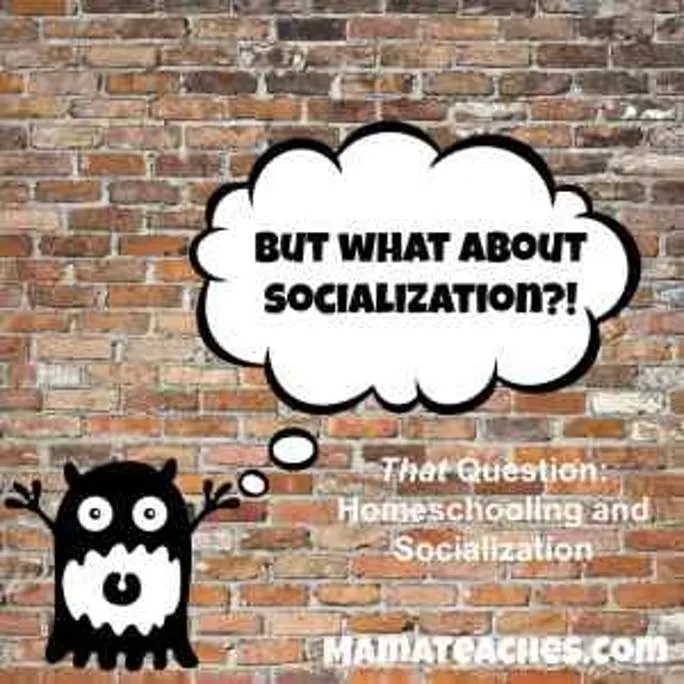Socialization and homeschooling.
They are the topic of almost every non-homeschooler’s conversation with a new homeschool acquaintance.
Here’s the answer to that question.

This article contains affiliate links to things that you might like.
If you homeschool, you probably have a pretty good idea of what thatquestion is.
It’s not a question about curriculum or the actual education of your child.
It’s not a question about what books you’ll use or what your school days look like.
It’s the socialization question. “But what about socialization?” Socialization and homeschooling, it comes up all of the time.
Socialization and homeschooling – does it exist?
Meanwhile, as that mother asked me that question, my kids were playing nicely and appropriately with children of different ages and her kid was hitting people with a stick.
I remember the absolute irony of the situation with a laugh every single time.
Since when does socialization mean only interacting with people of your own age in a classroom setting?
When did society decide to start defining it that way?
When did interactions with people of different ages in a variety of settings stop being socialization and start to be something that wasn’t as valued?
Chris Klicka, Senior Counsel of the Home School Legal Defense Association, wrote a great article on socialization and home schooling.
The first paragraph sums it up nicely:
“Academically homeschoolers have generally excelled, but some critics have continued to challenge them on an apparent ‘lack of socialization’ or ‘isolation from the world.’ Often there is a charge that homeschoolers are not learning how to live in the ‘real world.’ However, a closer look at public school training shows that it is actually public school children who are not living in the real world.”
Learning how to interact with people of all ages, whether it’s the cashier at Target or the kid in your TaeKwon Do class, is something that the majority of home schooled children learn to do well.
There are always exceptions, but for the most part, home schooling gives children the confidence to interact with those outside of their peer group.
Having conversations with adults while still being able to talk and play with kids their own age is not intimidating for them.
Socialization, to the home schooled child, is about being able to interact with anyone – not just with a couple dozen children their own age.
If the ‘real world’ was made up entirely of people your own age with similar backgrounds and experiences, there might be an argument that the classroom setting was the ideal place to learn socialization skills.
Happily, the ‘real world’ is much more diverse, much more exciting, and much more dependent on people being able to socialize across those divides.
That’s not just pro-home schooling rhetoric, that’s fact.
Homeschooling and Socialization
So, to those just starting out on the home school journey, I encourage you to smile and extend grace to those who ask you that question.
They just don’t know.
They don’t understand and, for many, they just don’t want to.
That’s okay.
They can worry about socialization all they want while their child runs around hitting people with a stick and yours are playing on the monkey bars.
Rest assured that your child will be just fine.
And maybe hand them that HSLDA article.
